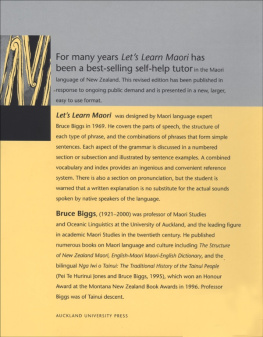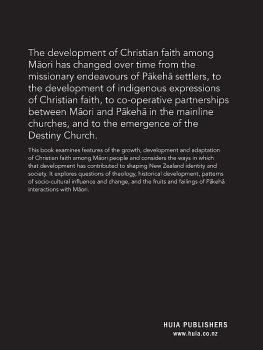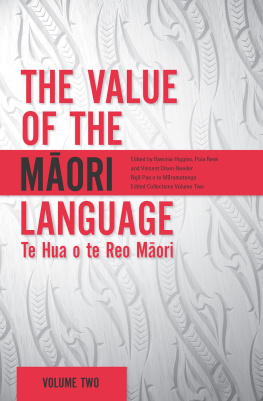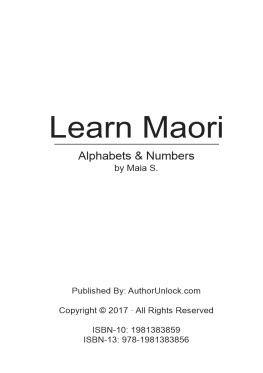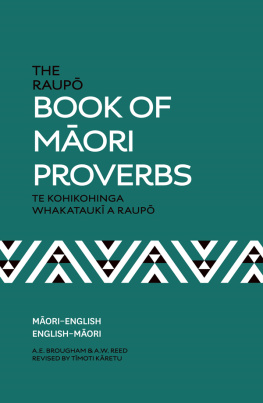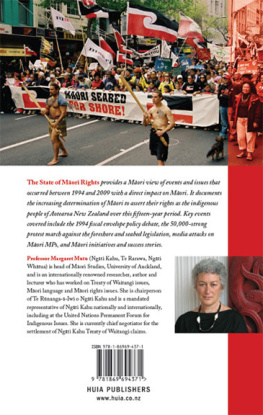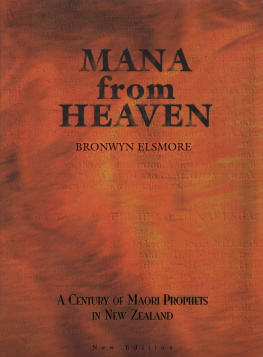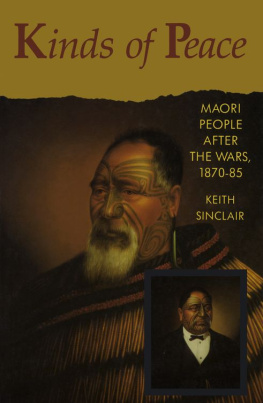Bruce Biggs - English-Maori, Maori-English Dictionary
Here you can read online Bruce Biggs - English-Maori, Maori-English Dictionary full text of the book (entire story) in english for free. Download pdf and epub, get meaning, cover and reviews about this ebook. year: 1990, publisher: Auckland University Press, genre: Detective and thriller. Description of the work, (preface) as well as reviews are available. Best literature library LitArk.com created for fans of good reading and offers a wide selection of genres:
Romance novel
Science fiction
Adventure
Detective
Science
History
Home and family
Prose
Art
Politics
Computer
Non-fiction
Religion
Business
Children
Humor
Choose a favorite category and find really read worthwhile books. Enjoy immersion in the world of imagination, feel the emotions of the characters or learn something new for yourself, make an fascinating discovery.

- Book:English-Maori, Maori-English Dictionary
- Author:
- Publisher:Auckland University Press
- Genre:
- Year:1990
- Rating:5 / 5
- Favourites:Add to favourites
- Your mark:
- 100
- 1
- 2
- 3
- 4
- 5
English-Maori, Maori-English Dictionary: summary, description and annotation
We offer to read an annotation, description, summary or preface (depends on what the author of the book "English-Maori, Maori-English Dictionary" wrote himself). If you haven't found the necessary information about the book — write in the comments, we will try to find it.
English-Maori, Maori-English Dictionary — read online for free the complete book (whole text) full work
Below is the text of the book, divided by pages. System saving the place of the last page read, allows you to conveniently read the book "English-Maori, Maori-English Dictionary" online for free, without having to search again every time where you left off. Put a bookmark, and you can go to the page where you finished reading at any time.
Font size:
Interval:
Bookmark:
ENGLISHMAORI
MAORIENGLISH
DICTIONARY
MAORIENGLISH
DICTIONARY

Auckland University Press University of Auckland Private Bag 92019, Auckland
www.press.auckland.ac.nz
eISBN 978 1 86940 641 7 Bruce Briggs 1990 This book is copyright. Apart from any fair dealing for the purpose of private study, research, criticism, or review, as permitted under the Copyright Act, no part may be reproduced by any process without the prior permission of Auckland University Press. Typeset by Typocrafters Ltd
Appropriate passive suffixes are indicated for passivable verbs (universals). 3. The quantity of all vowels is marked. 4. Maori words derived from English are included. Maori, like English, is a language that borrows words freely to express new concepts.
The criterion for inclusion in this dictionary is simply whether or not a word is used by those competent in the language. 5. For grammatical particles a reference is given to relevant sections of the grammar book Lets Learn Maori: a Guide to the Study of the Maori Language (rev. ed., 1973) by Bruce Biggs (hereafter cited as LLM).
They are represented conveniently by the five vowel letters of our English alphabet. Each vowel is either long or short. The distinction between long vowels and short vowels carries meaning and is all-pervasive (every vowel is either long or short). There is an extraordinarily persistent misconception that it is only necessary to mark a long vowel in a word to distinguish it from some other word which differs only by having a short vowel (e.g., papa, papaa). Nothing could be further from the truth. As every Maori vowel is either long or short, it is necessary to indicate the quantity of each and every one.
In this dictionary long vowels are written as double vowels. Single vowels are short. Most early and some contemporary Maori text does not distinguish between long and short vowels. Some recent texts distinguish long vowels by a macron or short bar placed over the vowel. Either convention should occasion no difficulty to users of this dictionary because of the alphabetic order adopted, which keeps Maori words differing only by vowel length in adjacent positions (see the section on Maori-English below). Hyphens are used in two ways in the dictionary: 1.
Before or after a space to indicate an affix (e.g., kite-a). This has no phonetic significance. 2. To join two words considered to be a sense unit (e.g., mata-uu (nipple)). In such cases the hyphen indicates that the components of the compound are pronounced as separate words.
As the language is spelt phonemic-ally it is only necessary to indicate the pronunciation of each consonant and vowel, and each vowel combination (diphthong). The comparisons are with New Zealand English. For a more detailed discussion of Maori pronunciation see LLM, 54.
Pronounce e as in merry, ferry, ee as in Mary, fairy: keke (cake), kekee (creak), keekee (armpit). Pronounce i as in pip, ii as in peep: pipi (cockle), piipii (chick), pipii (ooze out). Pronounce o as in port, oo as in porn: poti (boat), pooti (vote), koko (corner), kookoo (parson bird or tui). Pronounce u as in put, uu as oo in pool: kuku (mussel), kuukuu (pigeon), puru (plug), puuru (bull).
Pronounce ei as in hay and ie as in Russian nyet: kei (at), kiekie (a plant used in weaving). Pronounce eo and eu as in jello and Nehru, leaving out the consonants: reo (language), heu (shave). Rhyme ea with hair, ia with hear, oa with oar and ua with sewer: whea? (where?), whia? (how many), hoa (friend), hua (fruit). Pronounce oi as in boy and oe as in or wet leaving off the t: koi (sharp), koe (you). Rhyme iu with few and io with Rio: whiu (whip, punish), whio (whistle). (Words containing more than six vowels are stressed as two words even if written as one.) 1. (Words containing more than six vowels are stressed as two words even if written as one.) 1.
Stress the first long vowel, if there is one: MAArama, wheTUU, HAAngii, KOOhanga, wikiTOOria. 2. Stress a non-final diphthong if there is one: WAItangi, MAAOritanga, paRAAIhe, kaRAUna, AOtea, kapoREIhana. 3. If there is no double vowel and no non-final diphthong stress the first vowel in the word: WAhine, RAngatira, MArama, KAhawai.
Each entry consists of an English word or phrase followed by a colon (:) and a Maori equivalent. Where there are several Maori words equivalent to the English headword, which is usually the case, each one is separated by a comma. In many cases the part of speech of the Maori word is indicated either by an appropriate passive ending (or parenthesised passive form) indicating a Universal, or by N, A, P, L or Pnl. indicating Noun, Stative-adjective, Participle, Locative, Personal respectively. Universals may be used nominally, and as active and passive verbs; Stative-adjectives may be used as nouns and as verbs, but do not take passive terminations; Participles are a subclass of Stative-adjectives which may not be used as nouns. Locatives are never used verbally and do not normally take an article; Personals take the Proper Article.
Next pageFont size:
Interval:
Bookmark:
Similar books «English-Maori, Maori-English Dictionary»
Look at similar books to English-Maori, Maori-English Dictionary. We have selected literature similar in name and meaning in the hope of providing readers with more options to find new, interesting, not yet read works.
Discussion, reviews of the book English-Maori, Maori-English Dictionary and just readers' own opinions. Leave your comments, write what you think about the work, its meaning or the main characters. Specify what exactly you liked and what you didn't like, and why you think so.

